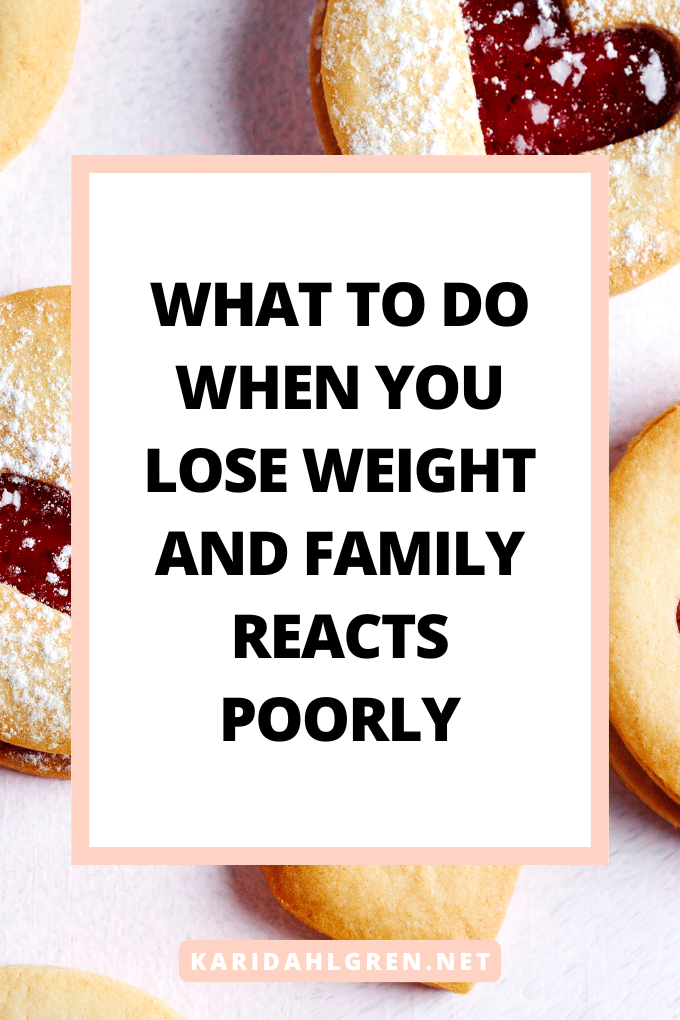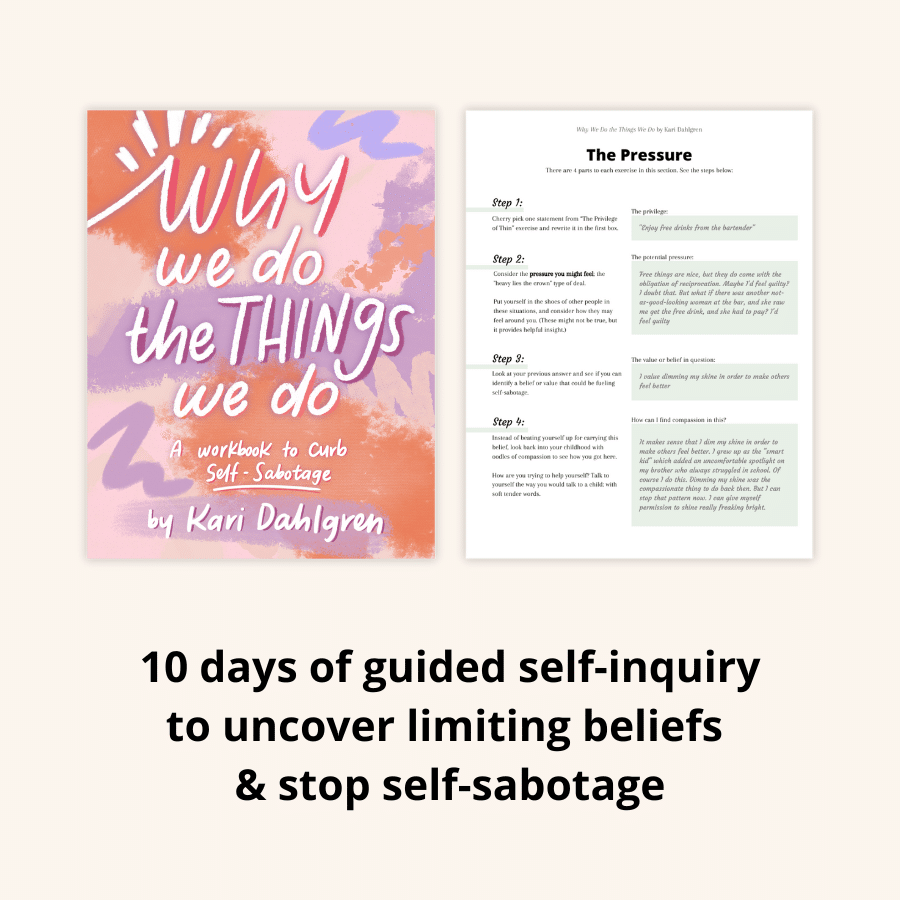
Have you ever noticed an uncomfortable shift in family dynamics after losing weight? Maybe they comment on your weight, or they say nothing at all. When things suddenly feel “off” between you and your family, it can stir up feelings of self-doubt, leaving you to wonder if the change is about you or how others now perceive you.
In my experience as an eating psychology coach, I’ve seen this pattern play out with people from all walks of life. Often, after the “success” of weight loss, some individuals feel overwhelmed and end up regaining the weight. A shift in family dynamics is one of the many factors that can trigger this self-sabotage.
Today, we’ll explore the unspoken family dynamics that shift when someone loses weight. I hope this helps ease any self-doubt that arises when others suddenly change how they interact with you after you lose weight. I also hope it can help prevent familiar patterns of self-sabotage that often happens to preserve family dynamics and spare other peoples’ feelings.
Understanding Internalized Weight Bias
When you lose weight, you might notice subtle changes in how family members interact with you. When something begins to feel “off,” it could stem from internalized weight bias—a deep-seated belief that your worth is connected to your body size.
Internalized weight bias occurs when we absorb society’s negative attitudes about weight and turn these external judgments into self-directed shame and criticism. According to a study in Body Image, internalized weight bias goes beyond just being unhappy with how your body looks—it’s more about the negative beliefs you carry about yourself because of your weight.[1]
Internalized weight bias can shape how others react when you gain or lose weight. People commonly talk about negative reactions from family members when they gain weight, but less is said about losing weight.
After weight loss, family members who have internalized negative messages about body shape might react in ways that reflect their own insecurities.
Even though internalized weight bias means that we often value weight loss—even though it’s not a sole indicator of health and not always pursued appropriately—it doesn’t necessarily mean that people will have a positive reaction to it.
Furthermore, when you lose weight, it doesn’t necessarily cause internalized weight bias to go away. It can actually cause increased anxiety about potential weight regain if self-worth is still tied to body shape. Sadly, in a vicious cycle, elevated internalized weight bias is associated with weight regain after weight loss.[2] Internalized weight bias is also associated with decreased mental and physical health-related quality of life.[3]
Why Family Members May Sound “Off” When You Lose Weight
If you recently lost weight, people around you might react to you based on the way that internalized weight bias causes them to feel around you. If your weight loss makes them feel more insecure, it can cause an uncomfortable shift in dynamics that inflict self-doubt.
When you no longer appear to struggle with your weight—which is not always the result of weight loss, because people can still struggle with body image no matter their shape or size—it may unsettle others still entrenched in those beliefs. Some family members might struggle to adjust to recent changes, leading to tension or resentment.
Here are other potential reasons why family members may act differently around you after you lose weight:
- Jealousy: Your new body shape might trigger jealousy in family members who struggle with their own body image, making them feel inadequate in comparison.
- Competition: This can also create a sense of competition, where your “success” highlights their insecurities, leading to subtle tension.
- Heightened Insecurities: When you lose weight, it doesn’t mean the people around you lose their internalized weight bias. When family members become more aware of their own unresolved issues with weight and self-worth, it can cause something to feel “off” as their behavior shifts.
According to a study in Medicine, Health Care and Philosophy, weight loss can create complex emotional dynamics within relationships, as those close to you may struggle with their own body image and feelings of self-worth, further intensifying these insecurities.[4]
When family members have an emotional reaction to one member losing weight, it can lead to a variety of potential reactions such as:
- Subtle Sabotage: Some family members might engage in subtle sabotage such as pushing food onto you even when you aren’t hungry; and insisting even after you’ve said no.
- Passive Aggression: When you lose weight, people around you might engage in passive-aggressive behavior such as backhanded compliments, driven by their own fear of change or insecurities.
- Distancing and Resentment: In response to your transformation, certain family members may distance themselves or express resentment, feeling threatened by the changes in you. They may not say it outright—either because they are ashamed or they don’t even realize it—causing something to feel “off” when they talk around you.
- Overcompensation and Overprotection: Some family members might respond by becoming overly protective or concerned, masking their discomfort with your transformation by offering excessive attention or trying to exert control. This behavior often reflects a desire to maintain the status quo and avoid confronting their own discomfort.
If you’re struggling with diminished family dynamics that coincide with losing weight, it can feel unsupportive and even discouraging. Up next, we’ll explore specific steps that you can take to protect your mental and emotional health.
How to Cope When Family Treats You Differently After You Lose Weight
Whether your family is directly commenting on your body after losing weight or indirectly shifting their behavior, you deserve to set clear boundaries and protect your well-being.
Here are some steps you can take to cope when family begins to act differently around you when you lose weight:
1. Prevent Self-Sabotage
When family dynamics shift after weight loss, it’s easy to fall into self-sabotage, especially if you value peaceful family dynamics and feel like you’re the source of tension. To prevent this, it’s crucial to recognize any limiting beliefs about body image and self-worth that could lead to self-sabotage.
One way to dig up these limiting beliefs is with my bestselling digital workbook, Why We Do the Things We Do. Although it’s geared towards people that want to reach their natural weight, it can also be used by people who have lost weight and want to prevent self-sabotage by identifying potential reasons for it.
For instance, if you believe that family members will not be there to support you if they are upset with you, and if you believe that losing weight has made others upset, you may self-sabotage weight loss in order to make peace with them. By recognizing these underlying beliefs, you can make more conscious decisions that align with your values, rather than giving in to the pressure to preserve the status quo.
2. Manage Your Own Emotions
As you navigate the emotional landscape of changing family dynamics, it’s crucial to recognize and manage your own feelings. This may include guilt, frustration, or even sadness. Developing emotional tolerance— the ability to hold space for uncomfortable emotions—can help you build resilience.
When family members treat you differently, it’s important to acknowledge these feelings without letting them derail you. Practicing holding space for these emotions without trying to resist them. Meditation has been shown to help foster emotional tolerance and even improve anxiety and depression.[5] This can help foster resilience against uncomfortable shifts in family dynamics.
3. Set Healthy Boundaries
Establishing and communicating boundaries is essential to protect your peace and promote mutual respect within your family. Clearly define what is and isn’t acceptable in conversations about your body and weight. If you want people to stop comment on your body size, you have every right to assert that boundary.
Be prepared for resistance or pushback from family members who may struggle to accept these boundaries. Approach these situations calmly, reinforcing your needs with empathy but also with firmness. This not only preserves your emotional well-being but also models healthy relationship dynamics.
4. Address Weight Talk Contradictions
Families often engage in contradictory weight talk or teasing, which can create confusion and tension. Gently pointing out these contradictions can lead to more honest communication and help reduce misunderstandings.
For example, if a family member both praises your weight loss and expresses concern about you ‘getting too thin,’ bringing this contradiction to light can encourage a more open and supportive dialogue.
Research shows that weight talk and teasing in the home environment are associated with negative outcomes like unhealthy weight control behaviors and increased psychosocial stress.[6] By addressing these issues directly, you help create an environment where everyone feels more at ease.
5. Seek External Support
If the emotional toll of these family dynamics becomes overwhelming, it may be beneficial to seek external support. Therapy or counseling, either for yourself or as a family, can provide a safe space to explore these deeper issues and facilitate healing. Additionally, building a support network outside of your family—whether through friends, support groups, or online communities—can offer much-needed perspective and emotional reinforcement during this time.
6. Foster a Healthy Relationship with Food
Finally, fostering a healthy relationship with food is crucial, especially when navigating the changes that come after weight loss. Many people lose weight through restrictive dieting, which can often lead to weight regain over time.[7] This cycle of restriction and regain can be emotionally draining and reinforce a negative relationship with food.
If you lost weight and feel totally at peace around food, you may not need this step. But if you feel deprived while trying to maintain your weight, it’s unlikely to be sustainable. If maintaining your weight feels like a constant battle, it’s important to reduce anxiety and develop a balanced relationship with food.
Start by listening to your body’s natural hunger and fullness signals rather than relying on strict food rules. Incorporate a variety of foods into your diet without labeling them as ‘good’ or ‘bad,’ which can help reduce internalized weight bias by reducing the morality of food.[8] Over time, this approach can help reduce the anxiety around eating and make your relationship with food more intuitive and sustainable, supporting both your physical and emotional well-being in the long run.
Embrace Your Journey, Unapologetically
When you feel emotionally resilient and physically nourished, you’ll be well-equipped to handle potential shifts in family dynamics after weight loss. Remember, your journey is uniquely yours. While the reactions of those around you may be unpredictable, what remains constant is your ability to choose how you respond.
By focusing on your emotional well-being, setting clear boundaries, and fostering a healthy relationship with food, you can create a foundation that supports continued growth. If you feel like your relationship with food could still use some healing, check out my free resources below:



